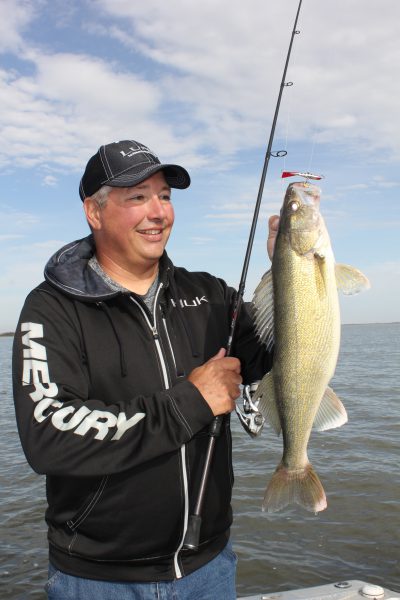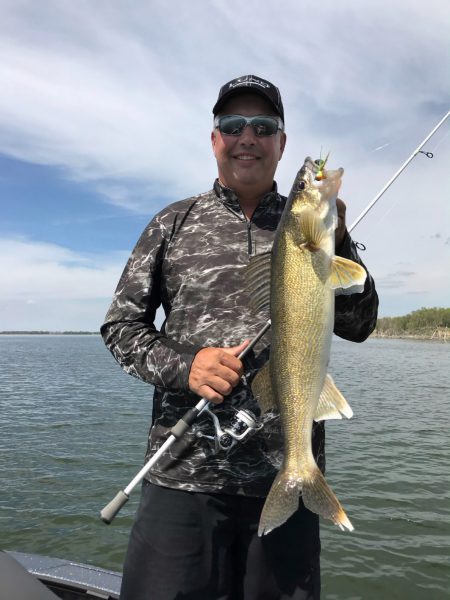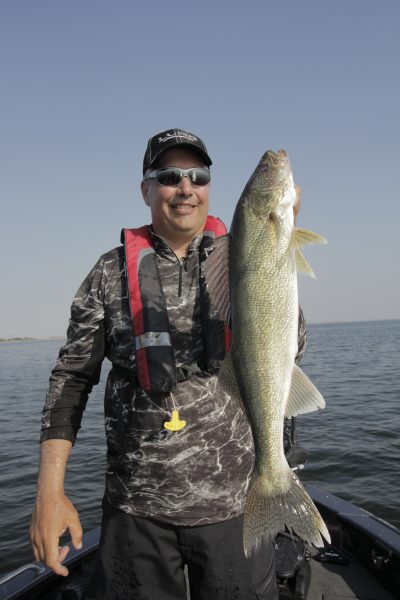Johnnie Candle: Staying the course
Category: article
Feb 25th, 2019 by fishing fanatics
Modified Feb 25th, 2019 at 11:08 AM
It all started in 1993. Johnnie Candle finished up his marketing degree from the University of Akron and decided he’d have one more summer helping his dad on his charter boat on Lake Erie. That summer passed and Candle had no job. So, like any young graduate, he took what he could get. A straight commission gig and he made nada, zippo, no money. Yep, what was a young man to do? Become a professional angler of course! Clearly the only logical choice.

Johnnie Candle is a name many fans of professional walleye fishing now know well. Whether or not they know anything about Candle, fans have seen his name and face splashed across numerous magazine and website articles, on television and on leaderboards of walleye fishing tournaments for 25 years. Candle has been there and done that in what can only be described as a shrinking professional endeavor, pro walleye tournament fishing that is.
Surviving in this environment is something very few pros have accomplished successfully. Candle still fishes the Cabela’s National Walleye Tour (NWT), guides on Devils Lake in North Dakota and hosts Pro’s Pointers TV on NBC North Dakota News, along with a variety of other endeavors. But, what if he could go back and give himself a little career advice along the way?
“The first thing I’d say to myself back in 1993 or 1994 is, what are you doing?”, laughed Candle. “So I graduate from college in 1993, and instead of going to find a job right away I work as a deckhand on my old man’s charter boat on Lake Erie. As the summer ended, I figured I’d better suck it up and go to work.
“Most of the local entry-level marketing jobs were filled by then, so I took a commission sales gig. Yeah, I made no money. One day I’m driving, and decided I’m going to quit. There is this new North American Walleye Association pro-tournament circuit happening and I had to go for it. I never fished tournaments, but I had the desire.

“I go in to tell my boss I quit in the spring of 1994, but I owed them about $2,500 in in draw against commission money. As I sat in his office he asked me what I was going to do and I explained. He told me to keep the $2,500 and gave me $1,000 to get started.
“I had no truck, 6-to 8-rods, all different, and an early 1980s Lund boat with a 40 horsepower engine. The boat had bench seats, I had to build the livewell. But it was the right thing to do.”
We asked whether or not he’d suggest kids follow in his early career footsteps. Candle offered a bit of wisdom.
“The solid and logical advice I always give young anglers interested in entering professional fishing is to get your education, be financially sound, and make sure you’re a good tournament angler,” said Candle. “Of course, I had none of that. I’m glad nobody offered me that advice in 1994. Looking back, I’d tell myself to keep my blinders on and bust your butt working hard. Never give up on your dreams if they are what you really want to achieve. Plus, failure is just a really good excuse to try again.”
As the years went by, Candle felt a bit frustrated. He was a solid marketing pro, putting himself out there and gathering a following, but his tournament fishing results weren’t great. From 2000 to about 2008. He started doubting himself and wondering why he seemed to not be in the conversation as a legitimate pro.
Those were the halcyon years of pro walleye fishing when the FLW had the Ranger, Crestliner Lund (RCL) Series that evolved into the FLW Walleye Tour. There also was the Professional Walleye Trail (PWT) and the Masters Walleye Circuit (MWC), all players in the growing world of walleye fishing. Yet, Candle felt things were rocky at best.
“There was a tremendous amount of animosity between the RCL/FLW and the PWT back then,” claims Candle. “Pro walleye fishing was getting some serious respect and nearing the level of pro bass fishing. So, each tour would claim superiority, etc. Nothing different than any other competitive businesses do anywhere.
“I wasn’t hitting it out of the park as a tournament angler, but as a businessman, it was working out well for me. My advice to myself back then would be to stay the course, investigate opportunities and ignore the white noise and negativity. It’s way too easy to get caught up in the negative, but it doesn’t mean a damn thing. I caught caught up in the negativity a bit and it didn’t have a positive impact on me.
“I just needed to stay above it and hold my position in the industry. You could tell times were changing and the PWT was falling apart. This was prior to the recession hitting in late 2007.”
So, as the recession deepened, the PWT closed its doors and eventually the FLW Walleye Tour did as well, the only show left in town was the MWC. Candle saw it as an opportunity, and it changed his professional life.
“Something I’d say to myself looking back on the recession years is to trust in your business model,” said Candle. “I wasn’t in the fishing game, I was a businessman. Just adjust accordingly.

“Many anglers from those days are no longer fishing, but I made the transition great. I went and fished the MWC and in my first year me and my partner Dave Noble won the MWC Championship.
“Since that win in 2010, I’ve been one of the names in pro walleye fishing that is most recognised. All the years of struggling and trying to find my place paid off. I didn’t panic and I stayed the course.”
Candle reflects somewhat solemnly on the days when pro walleye fishing had a shot to be the next big thing.
“We as a collective group had a chance to make something big happen back in the day,” said Candle. “If the businesses that ran the tournaments would’ve been more stable and not looked at the ‘pro’ circuits as a way to sell more boats and motors to the anglers fishing them, we may have survived.
“There was so much negativity in the sport at the time. Too many anglers concerned with what they could get from the sport as opposed to lifting the entire sport up. I think we’d be in a better place now if we worked together and not against each other.
“Still, I am very happen with where my business is now. I stayed the course and never gave up.”